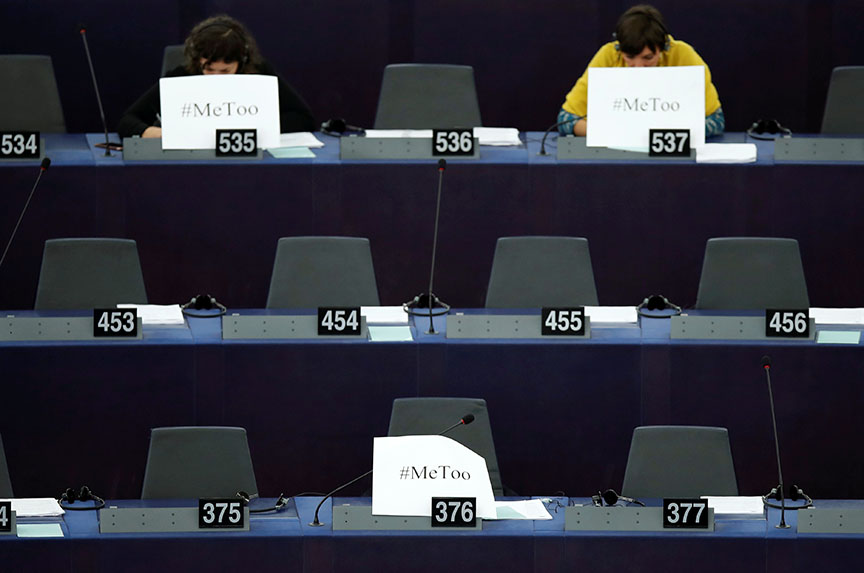 While #MeToo was born in the United States, it quickly sparked a sister movement in Europe, #MeTooEU. Brussels was shocked by the outpouring of stories of abuse and aggression against women—predominantly emanating out of the European Parliament—and the apathy with which their complaints had been handled through official channels. On this International Women’s Day, there is a lot of talk about changing this unacceptable situation.
While #MeToo was born in the United States, it quickly sparked a sister movement in Europe, #MeTooEU. Brussels was shocked by the outpouring of stories of abuse and aggression against women—predominantly emanating out of the European Parliament—and the apathy with which their complaints had been handled through official channels. On this International Women’s Day, there is a lot of talk about changing this unacceptable situation.
Looking back at what she calls “terrible developments” over the past twelve months, the European Council’s Gender Equality Adviser Cristina Gallach is definitely a glass-half-full feminist. She believes women in the European Union (EU) are in a better place today than a year ago.
Gallach attributed that conviction to the fact that “there is more awareness and mobilization” now due to the crises women faced over the last year, identifying political changes in the United States as one of those motivating challenges. “I think the younger generations are more involved than before,” Gallach said, explaining that there had been a sort of “gender-issue fatigue” in recent years that has now been shaken off.

“We all know that progress has been at a snail’s pace for the last [few] years,” Gallach acknowledged, “but we also know that nothing comes easily.” Gallach has more than two decades of experience at the top levels of leadership in major world institutions and organizations, which makes her well-poised to speak on this issue.
She explained that when it comes to achieving gender equality across the EU, the annual report by the European Institute for Gender Equality gives the EU 28 together a score of 66 percent. The Gender Equality Index gives countries scores between 1 and 100 based on gaps between men and women in six core domains: work, money, knowledge, time, power and health. Sweden is up at 82.6 percent but most countries are in the 50s. “That means we have a lot to do in all these areas,” Gallach said, “including in the areas of violence against women, education, work/life balance, [and] the pay gap.”
Gallach insisted the EU must be more than simply “declaratory” about issues such as harassment, particularly in the workplace. Women and organizations may say “zero tolerance,” she pointed out, but “we leave it to the ‘circumstances’ to do the follow up.”
According to Gallach, European governments are not yet “mainstreaming” women’s issues and gender perspectives throughout their ministries. Without a more coherent focus on the issue and its cause, she believes progress toward equality will remain evasive.
One of Gallach’s biggest concerns is that decision-makers and policymakers in the EU institutions remain overwhelmingly male, even though women outnumber men in the general population and as university graduates. “Somehow, they don’t find their way into EU positions,” she said, questioning: “So what is happening?”
She labeled the systematic discrepancy a “big, big challenge” that she intends to solve through training and educational awareness networks. She is focusing efforts all along the EU recruitment processes to try to bring more women on board. According to Gallach, “women apply much less to management jobs than men, [but] when they apply, the rate of success is much higher.”
“What do we have to do to encourage women and help them feel prepared?” she asked, adding: “They are already prepared and they just have to feel prepared to go for it.”
Teri Schultz is a Brussels-based freelance journalist. Follow her on Twitter @terischultz.
Image: Placards with the hashtag "MeToo" are seen on European Parliament members' desks during a debate to discuss preventive measures against sexual harassment and abuse in the European Union at the European Parliament in Strasbourg, France, on October 25, 2017. (Reuters/Christian Hartmann)
